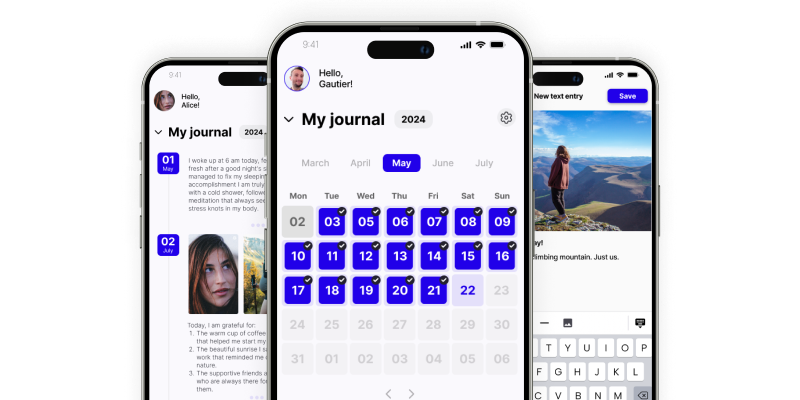What is Anxiety?
Anxiety is a natural response to stress, characterized by feelings of tension, worried thoughts, and physical changes like increased blood pressure.
Scientifically, it's our body's way of signaling potential danger, activating the “fight or flight” response.
While occasional anxiety is a normal part of life, chronic anxiety can be overwhelming and debilitating.
Controlling Anxiety
It's crucial to understand that the goal isn't to eliminate anxiety completely— that's both unrealistic and unnecessary.
Instead, the focus should be on gaining awareness and control over it.
The more we resist anxiety, the more it tends to persist.
By understanding the root causes of our anxiety, we can manage it more effectively.
This is where journaling prompts come into play, providing a structured way to explore what truly makes us anxious.

Why Using Prompts?
When engulfed in anxiety, finding clarity can feel impossible. We're often so consumed by anxious thoughts that we can’t even begin to pinpoint what’s wrong. This is where journaling prompts come to the rescue. They guide you in asking the right questions, nudging you towards self-reflection and understanding, even when you're feeling lost.
20 Journaling Prompts Ideas for Anxiety
These prompts are designed to help you ask the right questions and dive deeper into the causes of your anxiety. Each prompt has been carefully chosen to lead you through a reflective process, allowing you to see your anxious thoughts in a new light.
1. What specifically is making me anxious right now?
This helps you pinpoint the exact cause of your anxiety rather than feeling overwhelmed by a general sense of unease.
2. How does my body feel when I'm anxious?
Noticing physical symptoms can help you recognize when anxiety is starting to build.
3. What is within my control in this situation?
Identifying aspects within your control can reduce the helplessness anxiety often brings.
4. What is outside of my control right now?
Accepting what you cannot change helps in releasing unnecessary worry.
5. What past experiences are contributing to my current anxiety?
Understanding past triggers can prevent them from influencing your present state.
6. What can I do to ground myself when anxiety hits?
Developing grounding techniques provides immediate relief.
7. Who can I talk to about my anxiety?
Support systems are crucial. Knowing who to turn to can be comforting.
8. What are three positive things in my life right now?
Focusing on positives can help counterbalance anxious thoughts.
9. What would I say to a friend experiencing this same anxiety?
Often, we are kinder to others than to ourselves. This helps in self-compassion.
10. What is the worst-case scenario, and how likely is it to happen?
Putting your fears in perspective can often lessen their impact.
11. What steps can I take to prepare for the worst-case scenario?
Preparation can bring a sense of control and reduce anxiety about potential outcomes.
12. What evidence do I have that supports my anxious thoughts?
Challenging the validity of your fears can help in debunking irrational worries.
13. What evidence do I have that contradicts my anxious thoughts?
Counteracting negative thoughts with positive evidence helps in building a balanced viewpoint.
14. How have I successfully handled anxiety in the past?
Remembering past successes can empower you to handle current anxieties.
15. What are some self-care activities that make me feel better?
Listing out self-care activities gives you a go-to list when you're feeling anxious.
16. What are my long-term goals, and how can managing my anxiety help me achieve them?
Connecting anxiety management with personal goals can provide motivation and focus.
17. What is one thing I am grateful for today?
Gratitude can shift your focus away from anxiety and toward more positive feelings.
18. How do I want to feel instead of anxious, and what small steps can I take to feel that way?
Visualization and action steps can guide you towards desired emotions.
19. What’s one small thing I can do right now to alleviate my anxiety?
Immediate small actions can bring quick relief and incrementally build up to bigger changes.
20. What have I learned about myself from my anxiety?
Reflecting on lessons learned can turn anxiety into a tool for personal growth.
Conclusion
Anxiety can feel overwhelming, but it doesn’t have to control your life.
By utilizing journaling prompts, you can start to unravel the complexities of your anxious thoughts and gain valuable insights into your triggers and coping mechanisms.
Remember, your goal isn’t to banish anxiety but to understand and manage it more effectively.
Using our journaling app available on iOS, Android, and web, you can easily incorporate these prompts into your daily routine.
Take the first step today towards a more peaceful and understanding relationship with your anxiety.







